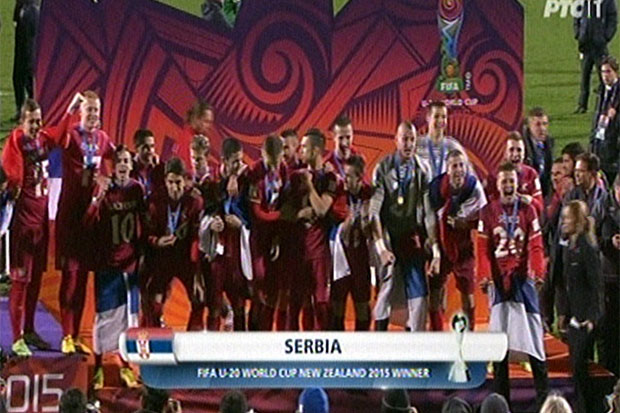
A new year is here and that means that it’s time for yet another rebuild for the Serbian national team. Manager Radovan Curcic will attempt to pick up the pieces after a disastrous Euro 2016 qualifying campaign. The last campaign was the worst in Serbia’s history and saw the team finish in 4th place with just 4 points from 8 matches. To top that off Serbia ended 2015 with a embarrassing 4-1 friendly loss to the Czech Republic.
It’s time to put all of that ugliness in the past and focus on the future as Serbia’s first matches of 2016 are a little more than a month away. Serbia will play friendly matches vs Poland and Estonia on March 23rd and 28th. These will be the national teams first tuneups before World Cup qualifying kicks off in September so it will be important to start things off with some positive results.
This is my list of the 23 players that currently deserve a spot on the national team and should be included in Curcic’s squad for the Poland and Estonia friendlies.
Goalkeepers
Vladimir Stojkovic: The reliable Stojkovic is having a solid season for Maccabi Haifa and is still Serbia’s best option at goalkeeper. If it wasn’t for his saves Serbia’s Euro 2016 qualifying campaign would have been even worse.
Predrag Rajkovic: Rajkovic has had some ups and downs in his first season for Maccabi Tel Aviv but he’s shown flashes of brilliance and will be Stojkovic’s eventual replacement in goal.
Marko Dmitrovic: Dmitrovic is playing very well for Spanish Segunda side Alcorcon and is showing himself to be a capable young goalkeeper.
Left Backs
Aleksandar Kolarov: The undisputed starting left back for Serbia. Can be inconsistent but he’s always dangerous and currently irreplaceable.
Filip Mladenovic: Played very well for BATE Borisov and is off to a good start with 1.FC Koln in the Bundesliga.
Centre Backs
Branislav Ivanovic: It’s time to shift Serbia’s captain to centre back. Hes been a rock at right back for years but he’s lost some of his speed and will do better in the centre. There has been a lot of inconstancy at the CB position for Serbia and Bane will help fix that problem.
Nikola Maksimovic: He is back and starting for Torino after a long injury absence. He was playing great before the injury and will hopefully return to that form soon.
Slobodan Rajkovic: Rajkovic has always been a enigma but when he stays healthy he plays well. He is putting in solid performances for Bundesliga side Darmstadt.
Milan Bisevac: Experienced, professional and reliable. The new Lazio player can be a big help to some of the youngsters in the squad.
Right Backs
Dusan Basta: The versatile Basta has not been getting called up by Curcic lately but he is very solid and deserves a spot on the squad.
Nenad Tomovic: He has struggled at times for Serbia and doesn’t add much in attack but he plays regularly for Fiorentina and is a good defender.
Midfielders
Nemanja Matic: The leader of Serbia’s midfield and a undisputed starter. He’s not having the best season for Chelsea but who is really?
Adem Ljajic: Adem played really well for the national team in 2015 and is Serbia’s most creative player. He is having a solid year for Inter Milan.
Dusan Tadic: Up and down performances for Serbia lately but the Southampton man can always deliver a deadly ball and is a good option on the wing.
Zoran Tosic: He can be wasteful and selfish at times but Tosic creates a lot of problems for defences with his speed. Still performs at a good level for CSKA Moscow.
Filip Kostic: Kostic is playing very well for Stuttgart and is always a threat with his speed and crossing ability.
Andrija Zivkovic: Zivkovic won’t be playing any football until the summer after Partizan threw him off the team when he refused to sign a new contract. Despite the disgusting mistreatment from his club Andrija is still a hell of a talent and the future of Serbian football. Hopefully FSS shows him some support at this difficult time and call him up to national team actions. He’s earned it after leading Serbia to U20 World Cup glory.
Marko Grujic: The new Liverpool signing has been a colossal monster for Crvena Zvezda and deserves to get a shot with the senior national team especially considering our struggles in midfield.
Lazar Markovic: Markovic had a rough 2015 but he’s shown some signs of life for Fenerbache and is slowly working his way back to his Benfica form.
Nemanja Gudelj: Gudelj is having a good first season for Dutch giants Ajax and is always a decent option as a defensive midfielder.
Sergej Milinkovic-Savic: Sergej has had some good and bad moments since his big money move to Lazio but he’s shown that hes a big talent and should be integrated into the senior national team.
Strikers
Aleksandar Mitrovic: Mitrovic really struggled in the last qualifying campaign. He’s had a up and down first season for Newcastle which is normal for a young striker moving to a big league for the first time. He has a lot to work on but is still Serbia’s top option at striker.
Nikola Stojiljkovic: Stojiljkovic is having a very good season for Braga and is more than deserving of getting his first call up to the national team.
Uros Djurdjevic: Djurdjevic had a great start to the season for Palermo but suffered a bad injury that sidelined him for a few months. He is now back healthy and scoring goals again.
Still out with serious injuries: Matija Nastasic and Ivan Obradovic.
My starting XI:

